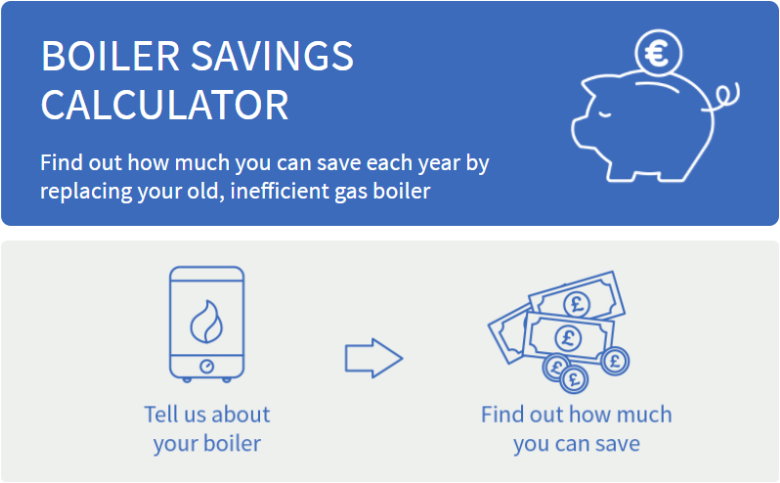
The Complete Gas Boiler Replacement Guide: How Much Will it Cost? How Much can you Save? and How to Find the Right Boiler and Installer for Your Needs
A new gas boiler can give you a warm, comfortable home and save you £100’s on your gas bill. But you probably have some questions.
- What are your options for replacing your old gas boiler?
- What type and size of boiler do you need?
- How much will it cost and what will you save?
- How can you find an installer you can trust?
The Complete Gas Boiler Replacement Guide will give you the information you need to make your decisions.
What’s in the Guide?
Everything a homeowner could need to know on Gas Boiler Replacement – all in one place.Click to tweet 
Boiler Types Explained
Combi Boilers vs Conventional Boilers
 A combi boiler provides heating and hot water directly and on demand, whereas a conventional system will heat a tankful of water at a time. Changing a boiler is a great opportunity for you to review the system you are using, and decide if that’s what best meets your needs. Here’s what you need to know:
A combi boiler provides heating and hot water directly and on demand, whereas a conventional system will heat a tankful of water at a time. Changing a boiler is a great opportunity for you to review the system you are using, and decide if that’s what best meets your needs. Here’s what you need to know:
What heating system do you currently have?
The very first thing to do is to check what type of system you are using right now. Don’t worry if you’re not sure. There are some easy ways to tell just by looking around your home.
A conventional boiler uses a cold-water feed, usually from a couple of tanks in the loft, to provide heat. Part of this heat is used to warm a separate tank of hot water, often found in an airing cupboard or elsewhere inside the house.
A combi boiler provides both heat and hot water on demand. Usually there is no hot or cold-water tank needed, although you might find them in your home if the legacy system used a conventional boiler. An easy way to check if the hot water tank is still in use is by looking at your controls; if you need to turn on the hot water before using it, you’re not on a combi boiler.
Because combi boilers don’t need to store a tank of hot water, they are generally considered the more efficient choice. However, in some situations a conventional boiler might suit your needs better, so do consider all your options before making a decision.
Combi boiler pros and cons
Combi boilers (or combination boilers) are the most popular option for most homes in the UK. There is no need for a hot water cylinder or tank.
Pros:
- Heat and hot water is delivered instantly and on demand;
- no tank is required in the loft or airing cupboard;
- boilers are compact in size.
Cons:
- Maintaining good water pressure can be an issue if more than one tap is used at once;
- converting from a conventional to a combination boiler can be tricky.
Combi boilers are suitable for the majority of homes, and are particularly suited to smaller homes where multiple hot water demands are less frequent. They are a great choice for those limited on space, as the unit tends to be smaller and there is no space taken up by the hot water tank.
Conventional boiler pros and cons
Conventional boilers might also be called open vent or regular boilers, but all the names refer to the same thing. Essentially, you have a boiler somewhere in the house which supplies heat to the radiators and also heats a tank or cylinder of hot water. In the past, these were the norm when it came to boilers, so if you live in an older home, this may well be what you’re dealing with.
Pros:
- Hot water pressure does not reduce no matter how many taps are in use
Cons:
- Hot water can run out, meaning you’d have to wait for it to reheat;
- hot water cylinder and cold-water tank take up space in the home.
For homes that often need multiple hot water supplies at the same time, these can be a great choice. Larger homes with lots of occupants and less concerns about space might decide to go with this option.

What is a System Boiler?
Some heating systems use a type of boiler called a system boiler. You might also hear it described as a sealed system, but both refer to the same thing. The system boiler provides heat to your central heating system and then heats up a tank of hot water too, just like a conventional boiler, but with some important differences.
 With a system boiler, many of the major components of the heating and hot water provision are built into the boiler. This makes installation quick and easy, and renders the system somewhat more efficient than a conventional boiler.
With a system boiler, many of the major components of the heating and hot water provision are built into the boiler. This makes installation quick and easy, and renders the system somewhat more efficient than a conventional boiler.
Hot water from the system boiler is actively pumped around the radiators and to the hot water tank, rather than relying on convection to move the heated water around. This means it is more responsive and more economical to run than conventional boilers, and it no longer requires the cold-water storage tank in the loft.
Pros:
- No need for a separate cold-water tank;
- hot water from multiple taps without pressure loss;
- more efficient and a faster response than with a conventional boiler.
Cons:
- Hot water is not instant;
- hot water can run out and will require time to heat up;
- hot water cylinder needs to be stored.
As with the conventional boiler, the system boiler can be a good choice for larger homes or buildings where multiple demands are placed simultaneously on the hot water system. As this is a more efficient system which eliminates the need for a big tank in the loft, it is usually preferred over conventional boilers.
What is a condensing boiler?
 Most modern boilers are condensing boilers. A condensing boiler is not strictly another boiler type. Rather, it is a technology that your boiler features. You will still choose either a combi, conventional or system boiler, but will have the efficiency improved by the condensing technology. Modern condensing boilers get the highest energy efficiency ratings, saving you money and reducing your carbon footprint.
Most modern boilers are condensing boilers. A condensing boiler is not strictly another boiler type. Rather, it is a technology that your boiler features. You will still choose either a combi, conventional or system boiler, but will have the efficiency improved by the condensing technology. Modern condensing boilers get the highest energy efficiency ratings, saving you money and reducing your carbon footprint.
How does a condensing boiler work?
Condensing boilers are designed to make better use of the heat they produce. Non-condensing boilers waste heat as it is released in the form of hot gasses up the flue. A condensing boiler traps these hot gasses, and ‘condenses’ them to extract the heat, which is then used in your heating system. This means less heat is required from your burner and therefore you use less gas.
The benefits of condensing boilers
Upgrading your heating system to a new, efficient condensing boiler comes with a whole host of benefits, including:
- Less energy consumption: A condensing boiler will be between 15% and 30% more efficient than a non-condensing alternative, which is doubly beneficial. You’ll spend less to heat your home and provide hot water and your demand for fossil fuels will also be reduced.
- Eco-friendly: Less fuel consumption means a lower carbon footprint. Every condensing boiler installed saves around 1.7 tonnes of CO2 every year, helping you lower your carbon emissions and do your bit for the environment.
- Improved reliability: Modern condensing boilers are fitted with a heat exchanger which is constructed from stainless steel or another non-ferrous material. This means they won’t rust over time, resulting in less to go wrong and a more reliable outlook for you.
- Safer: Condensing boilers are actually safer than non-condensing models. This is because there is less chance of something getting sucked into the boiler and therefore a lower risk of carbon monoxide problems and breakdowns.
- Space saving construction: Your condensing boiler is likely to be smaller and more attractive than an older boiler would be. There is no need to find space for a hot water tank either
Building regulations state that new boilers should have a minimum efficiency of 86 per cent for gas and 85 per cent for oil. This means that a replacement boiler should usually be a condensing boiler, although exceptions can be made if this is not a viable option.
What size of boiler do I need?


Choosing the right size of boiler can make all the difference to your warmth and comfort as well as your bills. Undersizing your boiler will mean you haven’t got enough hot water for radiators and taps, meaning lukewarm showers and a chilly home in winter. Oversizing your boiler will mean increased up front costs and wasted fuel and money through less efficiency.
Guideline sizes for typical homes
Every home is unique and sizing your boiler is a complex calculation that a qualified heating engineer will help you with. Calculating the heat requirement involves an assessment of the size of space involved, the required temperature, the prevailing outside temperature and the heat lost through windows, doors, floors and walls.
Combi Boiler Size for Typical Homes
A typical combi-boiler size for most flats, apartments and small houses might be around 24kW- 28kW. Combi sizes for a smaller 3 bed house might start at 28kW but depending on the size of house, number of radiators and perhaps the presence of an en suite that could go up as high as 40kW. Large houses with perhaps up to 20 radiators and multiple bathrooms would be looking at the higher size combis, anywhere from 33kW up to 42kW.
If you use a heat loss calculator to get an estimate on the size of your boiler it is important to understand that you are sizing for heat only. A combi boiler supplies heat and hot water and the boiler size you need often depends more on the hot water. You should note that if your household is likely to have high hot water usage, then a combi boiler might simply not be capable of supplying the hot water for your needs. Ask yourself whether you are likely to be needing to run multiple showers at once.
Conventional Boiler Size for Typical Homes
A conventional boiler is heat only. It doesn’t have to provide hot water on demand but instead heats a water tank. The result is that the output from your boiler is much lower. It is much closer to the answer to your space heating demand, with a little added on to account for heating the water tank.
A typical size for conventional boiler to serve a 1 bed flat might be as low as 12kW. Properties with 2 – 3 beds might be in the 15kW to 18kW range and larger 4 bedroom homes might need boilers from 24kW – 30kW. Of course these will all depend on level of use and insulation levels as well as the variation in size of house.
The very best way to find out what size boiler you’ll need is to get a Gas Safe engineer to come and assess your home. You won’t be obliged to go ahead with anything, but it will give you an accurate calculation so you can make more informed choices.
Factors to think about
When sizing your boiler, there are some key factors which will influence how big an appliance you’ll need:
- Insulation: A well-insulated home will require less energy to heat it to a comfortable temperature, and then to maintain that temperature. It’s worth checking your insulation is all up to date before replacing your boiler, and taking this into account when choosing the right size.
- Size and type of home: It’s fairly self-explanatory that the larger your home is, the more heat energy it will require, and therefore the larger the boiler should be. Think about how many rooms you have as well as how large they are, and taking into account whether your home is detached, with more external walls, or terraced, with less.
- Number of radiators: Each radiator will be rated in British Thermal Units (BTU’s). There is lots of guidance online about how to ensure you have the right size radiator(s) for each room, and what the kW output is likely to be. Adding up these outputs will start to give you an idea of the kWh rating your boiler needs to be in order to cope with demand.
- Number of bathrooms and inhabitants: A combi boiler should be able to cope with the demands of a couple of bathrooms, as long as there are not too many people using them all at once. If you know you’ll get through a lot of baths and showers each day, possibly with multiple demands, you might be better looking at a system boiler to ensure you don’t lose water pressure.
Thinking about what your home is like and how you and your family use it can help you plan for the size of boiler that will adequately cope with all your needs. Consider if your behaviours are likely to change in the foreseeable future, for instance if you’re planning on having a baby or if an older child is likely to leave home, and try to factor these in as well.
Boiler Prices and Costs
The costs of installing a new boiler vary widely depending on the work that is required and what type of boiler you go for. Searching out boiler prices online can give you a skewed estimate of the actual overall cost, as the installation charges can often almost double the cost of buying the boiler alone. Our guide is intended to give a very rough estimate for your budget, but may not be wholly accurate as other factors come into play.
Buying a boiler
The cost of boiler purchase will depend on the type you need, the capacity and how efficient it is. A-rated boilers cost more than lower efficiency models, but will pay dividends in the long run as they’ll save you more on your heating bills.
As a rough guide, for a budget boiler you’ll be looking at around £550 – £580 for the boiler only.
Standard, mid-priced boilers can cost from around £600 – £850, and should ensure a life expectancy of 7 to 10 years. The higher end of this price bracket tends to come with a no quibble guarantee to repair or replace, usually over more generous terms than a standard warranty. Towards the lower end, customers may have to pay for repairers to come out, although this is usually refunded on production of the correct paperwork.
At the top end of the scale, you can expect to pay £900 and up for a high-quality boiler with all the bells and whistles. Efficiency in this bracket is highest, and you’ll often find warranties that run for 10 years or more. Customer support is higher, and boilers are almost always installed by manufacturer trained engineers.

The cost of installation
What you pay for installation will depend on precisely what needs to be done, and which boiler you are changing from and to. For instance:
- Replacing a condensing combi boiler with a new one, in the same position: Your old boiler needs to be removed and taken away, and the new one installed. Expect to pay from £540 – £660 for this. If your radiators and pipework are older, you might need to have a mechanical flush which can cost as much as £510.
- Replacing a non-condensing boiler with a condensing one, in the same position: Your engineer may need to move or replace the flue to accommodate your new boiler which can add to the cost. As a guide price, the basic installation will cost around £640 – £770, although problems with the flue can add to this cost. If pipes need to be moved, you can expect to pay around £250, and you may need a mechanical flush as above.
- Moving the boiler, upgrading the heating system: If you need your new condensing boiler to be installed in a different place, complicated work is needed to route a new flue and add a drain for the condensate. The installation will therefore cost in the region of £1,140 to £1,440. A power flush is almost certainly needed which costs around £200.
- Changing a system or conventional boiler for a combi: For this installation, your engineer will need to convert the central heating system to cope with the new boiler. They will need to remove some equipment such as the hot water tank and expansion tank, and will need to plumb in a condensate drain. This costs upwards of £1,440, plus potentially costs for new pipework and a flush.
The price you are quoted may be higher or lower depending on where you live geographically too. Engineers in and around London and the South East tend to charge higher prices. You should always get several quotes from qualified installers so you can inform your budget more accurately and find the right fit for you.
How much can I save by replacing my old boiler?
Switching your old, inefficient boiler for a new, condensing model will save you money with every year that passes. The Energy Saving Trust state that you can save up to £330 a year by replacing your boiler, but this is something of an ambitious figure for most of us. Let’s take a look at some more realistic figures so you know how much you could save.
For the purposes of this, we’ll take a typical £1,800 A-rated boiler, operating at around 90 per cent efficiency, and see how much it saves compared to an old, inefficient model. Calculations are based on an average home, consuming around 17,300 kWh of gas each year at an annual cost of £670. The ‘payback period’ refers to the amount of time your boiler will have to run for until it’s paid for its own cost in savings.
| Efficiency of old boiler | % saving | £ saving | Payback period |
| 60% | 33% | £237 | 7 ½ years |
| 65% | 28% | £201 | 9 years |
| 70% | 22% | £158 | 11 ½ years |
| 75% | 17% | £122 | 15 years |
| 80% | 11% | £79 | 23 years |
As you can see, the more inefficient your old boiler is, the more you can save by replacing it. However, you should also keep in mind that energy prices are likely to rise in the future, so by reducing the amount of gas you use, you are cushioning yourself against the impact of any hike.
Leading gas boiler brands in the UK
There are many gas boiler brands out there, all with fairly decent products to offer. However, if you’re looking for something reliable, great value for money and which is backed by a big brand, you can’t beat models by these eight household names:
- Worcester Bosch: A good, strong brand with a long track record of delivering high quality products. These boilers tend to be quiet and highly efficient, although some reviewers comment that the controls are a little confusing to use. Generally considered to be top of the range, you’ll pay a bit more for that Worcester Bosch badge.
- Glow Worm: These boilers have a strong reputation for being reasonably priced, and compared to some of the other big names they do offer amazing value for money. The company also has lots of good feedback in terms of their customer service.
- Baxi: A solid mid-range boiler, this is a brand which offers a good half way price point between the Bosch and the Glow Worm. They have a reputation for excellent reliability, and have plenty of high efficiency A-rated models.
- Ideal: Overall these boilers are good value for money. A handful of customers have had issues with breakdowns, but have been delighted with their included five-year parts and labour guarantee.
- Vaillant: The other ‘top of the range’ supplier, Vaillant boilers have been around for decades. They aren’t the cheapest option, but you are buying into a company who are leading the market in terms of R&D.
- Potterton: Low prices, a solid reputation for reliability and the winner of the Which? best buy many times; what’s not to love about this home-grown British boiler brand?
- Alpha: Another middle of the road priced supplier, Alpha boilers are reliable and efficient. There has been some negative feedback regarding customer service, but nothing to write home about.
- Vokera: The real budget choice, these boilers are pretty much the cheapest out there, and are not renowned for longevity or reliability. However, they are still a popular choice for tenanted properties and second homes, owing to their amazing value purchase price.
There are many other brands around which provide perfectly serviceable boilers, so don’t panic if you’re considering a brand not on this list. From Biasi to Heatline, Keston to Veissmann, all boilers have to conform to the same safety and efficiency standards. Make sure you read reviews and check the company’s history before making a choice and you won’t go far wrong.

Boiler warranties
Warranties are important. Warranties give you some assurance that your investment is well placed, and that you’re not going to lose out if something goes horribly wrong. These days, the warranty you get can be somewhat confusing, and wildly different between one manufacturer or model and another.
All boilers will be supplied with a minimum one year guarantee, and in many cases, you’ll be able to extend this, either at your own cost or through an offer from the manufacturer. Extended warranties can run from two years up to 10, and will only be maintained if you stick to the manufactures servicing schedule.
There is an important difference to note between a warranty and a guarantee, which could have an impact for you in the future. That is, warranties allow manufacturers to serve you with a call out charge, and to change the terms of the warranty without notice. A guarantee tends to be more solid than this, but currently only Worcester Bosch offer this type of agreement.
Do be aware that it is usually the householder’s job to register their boiler with the warranty scheme, so don’t assume your engineer has done it for you. Registration should be as simple as a phone call, returning a postcard or even getting it done online. Don’t forget to register, and do check back with the manufacturer in around a month to ensure you’ve been put on the system correctly.
Financing your new boiler
Sometimes replacing a boiler is not as simple as deciding when the time is right. Sometimes, due to a breakdown or fault, we are forced to replace our boilers before we were ready, and before our bank balance was ready too. A boiler is one of those appliances that it’s hard to live without, and in cold weather or if you have vulnerable people in the family, going without heating and hot water is a risk not work taking.
If you’re desperate to replace your boiler but don’t have the cash available, there are some routes for you to explore. Here are just a few of the ideas which could help you finance your new boiler so you don’t have to wait.
- A personal loan or credit card: If you are able to get a personal loan from your bank or have a credit card with enough space on it, you might think this is the best way to finance your replacement boiler. However, this might not be the cheapest route, if you are eligible to take up any of the other offers below.
- Finance from your fuel supplier: Fuel suppliers like British Gas and npower install boilers themselves, and often offer competitive rates on short term loans to pay for them too. British Gas currently offer up to 100 per cent finance at 14.9% APR with loans available over 3, 5, 8 or 10 years. It’s worth checking with other suppliers to see what they can offer you too.
- Finance from your installer: Independent installers, both local and national, are often able to hook you up with a low rate finance deal to help you pay for your boiler. Do check the APR to ensure you’re getting good value, and make sure you understand how much you’ll end up paying back as well as the level of payments you are committing to.
- Zero percent finance deals: If you shop around, there are often zero percent finance deals to be had from installers and other companies around the UK. Most will not offer zero percent finance indefinitely, so many deals are fixed for a year or 24 months. If you know you’ll be able to pay it off and there are no big penalties for doing so, this can be a great way of getting an inexpensive, short term boiler loan.
- Deferred payment deals: As with the 0% finance deals, you may need to shop around to find these but they do come up from time to time. Deferred payment deals mean you sign up to a finance agreement, but don’t need to start paying it back until three, six or even 12 months’ time. This gives you the chance to rearrange your financials to accommodate this new outgoing, and can be a lifesaver if you’re boiler has unexpectedly packed up.
If you’re looking for finance for a boiler, do shop around to ensure you’re getting a good deal. Read all the small print carefully, and make sure you understand what the penalties are for paying it off early, for missing payments and other unexpected eventualities.
Free boilers for those on benefits
If you are in receipt of benefits, it’s worth investigating whether you are entitled to a free boiler under the ECO scheme. Under this scheme, the UK’s largest energy providers are required to help people in receipt of certain benefits to cut their carbon footprint and energy costs. They do this by installing free insulation and, in some cases, free boilers.
You are likely to qualify for a free boiler if:
- You are receiving tax credits and have a household income of lower than £16,010
- You receive income based benefits like income support or pension credits
- You have children, are over 60 or have a disabled person in the house
The qualifying criteria for this are pretty complicated, so it’s best to find out early on if you’re likely to qualify. You can do this by contacting an Energy Saving Trust advice centre on 0300 123 1234 in England or 0808 808 2282 in Scotland. Things change frequently in regards to schemes and funding, so it’s always worth checking if there is any support available, even if you don’t think you’ll qualify.
Who should install my boiler
The only people who should be involved in the installation of your new boiler are Gas Safe registered engineers. You can find an engineer in your area using the Gas Safe website which holds details of all the currently registered technicians in the UK.
Don’t be tempted to trust a fitter on their appearance alone. It’s easy for anyone to have a professional looking website, a sign written van, and even to use paperwork carrying the Gas Safe logo, but it doesn’t guarantee they are registered.
Before allowing anyone to work on your boiler or other gas appliance, always ask to see their Gas Safe registration card. This card should carry their name, photograph and the dates their ID is valid for. Turn the card over and check what work they are qualified to do using the categories listed. Some engineers will be trained to work on boilers, but may not be qualified to work on gas fires or cookers. Always ensure they are covered to do the work you want them to.
If you are in any doubt, call the Gas Safe Register’s free helpline on 0800 408 5500, and if you suspect someone to be operating as a gas fitter without the right qualifications, you can report them anonymously on the Gas Safe website at www.gassaferegister.co.uk.
Getting multiple quotes
By far the easiest way to start budgeting and decision making about your new boiler is to get some specific quotes from experienced, qualified engineers in your area. One of the easiest ways to do this is by using our database at Green Business Watch. Our user-friendly search facility makes it easy for you to find and contact approved, vetted and checked engineers who are serving your area.
Almost half of us look for at least three quotes when planning significant home improvements. When you’re dealing with individual companies by yourself, this can be a time-consuming process, and difficult to manage. When you go use our bespoke database to find your next installer, you can make your choice easily. Here’s how it works:
- Answer questions once: Instead of repeating yourself to several different companies, we’ll just ask you once about your home, your geographical location and fuel supply. This way we’re able to target the best installers for your needs.
- Three quotes arrive: We’ll select and invite three installers to quote for your job. All the installers on our database have been vetted and checked by us, so you can be confident you’re dealing with professionals.
- Choose your favourite: You can review your quotes at your leisure. There are no pushy sales tactics here, so take your time to check out the companies who have quoted you, or ask us to invite more businesses to issue a quote too.
Once you’ve decided on an installer for your job, you can arrange for the replacement process to start and can start enjoying a cheaper, less carbon intensive lifestyle soon.
The Boiler Replacement Process
Once you’ve had your quotes in, you can start making arrangements to have your boiler installed. This process shouldn’t be arduous, and should be made easier by using our service from the start. Here’s how it works:
Choose installer and boiler
Different installers may quote for different brands of boiler, and may offer different facilities such as finance, extended warranties and suchlike. Now you’ve got your quotes in hand, you can make an informed decision about which one you’d like to go with. Simply notify your installer that you’d like to take up their quote, and they will arrange a mutually convenient date to undertake your installation.
Replacement boiler installation
The installation process itself should be relatively straightforward, and your installer should work hard to minimise disruption and inconvenience to you and your family. When they arrive, it’s a good idea to check their Gas Safe accreditation to ensure you are dealing with a qualified person. The process itself will take most of a day, or could even run into a second day if a lot of work is required.
Once the boiler is installed, you should receive operation instructions from your installer, including how to use the features, programmer and any relevant safety information. They should also ask you to register for a free gas safety check in a year’s time, which can also be a good opportunity for your new boiler to have its first service.
After sales support
Once the engineer has left your home, you should have plenty of ongoing support from the installation company. Depending on what they offered, you should have between one and ten years warranty on the product itself, as well as a guarantee on the workmanship involved in the installation. This should mean that any problems will be rectified by the company free of charge, as long as you’ve kept up the routine servicing of the appliance.
Manufacturers recommend having your boiler serviced once a year. Often your first service will be free, but it’s worth paying to continue with the annual service, as it will ensure your boiler is trouble free and running efficiently for years to come. Talk to your engineer about emergency call outs as well, as it’s always good to have a number by the phone in case of a disaster.
If, for any reason, you are not happy with the work that has been carried out, you should talk to the company in the first place. If this does not result in a satisfactory response, you can report your engineer to the Gas Safe Register on their complaints page, and they will assist with your issue.
Getting a new boiler can be beneficial for you, beneficial for your home and also for the planet. Taking care to choose the right boiler, the right installer and the right ongoing maintenance will ensure your investment is well placed, and that your boiler lasts for many years to come.




